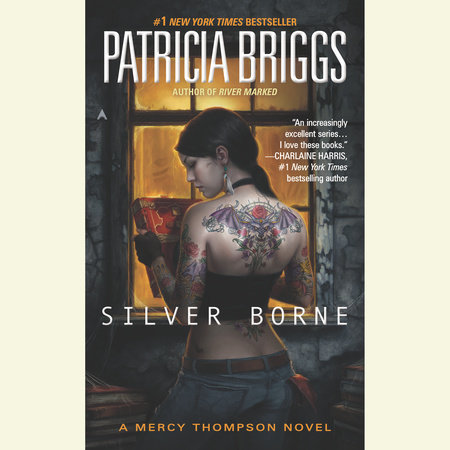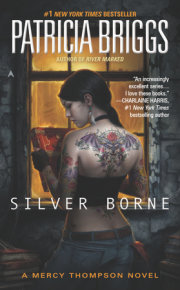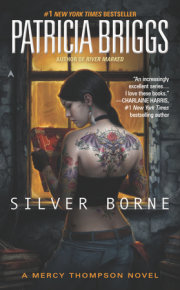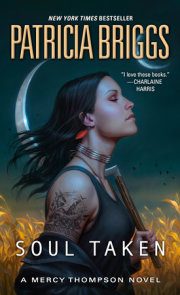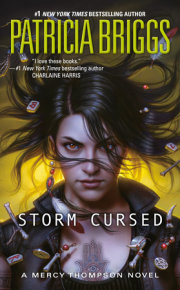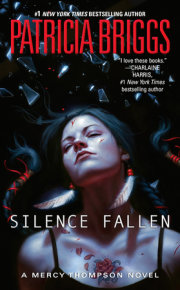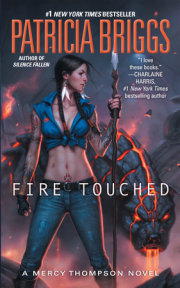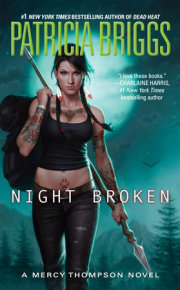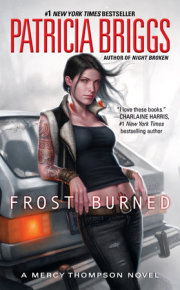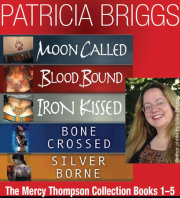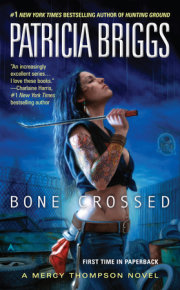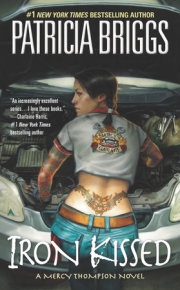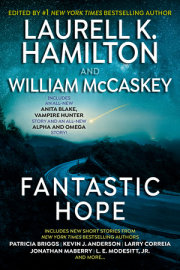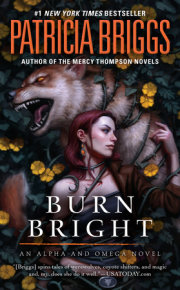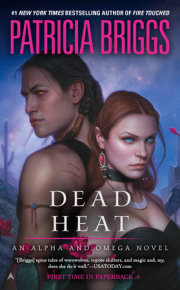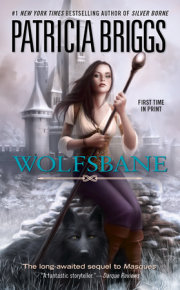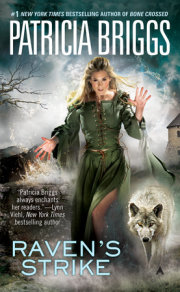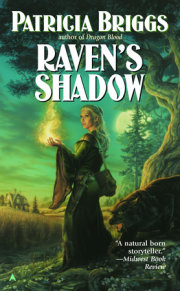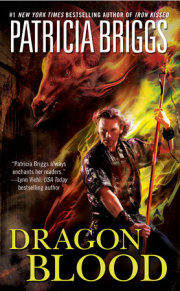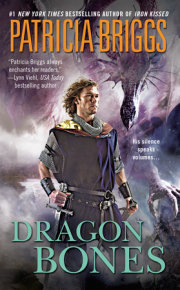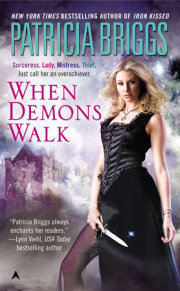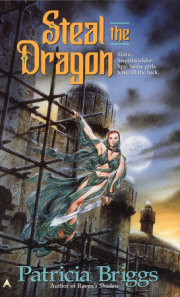Table of Contents
Title Page
Copyright Page
Dedication
Acknowledgements
Chapter 1
Chapter 2
Chapter 3
Chapter 4
Chapter 5
Chapter 6
Chapter 7
Chapter 8
Chapter 9
Chapter 10
Chapter 11
Chapter 12
Chapter 13
Chapter 14
Chapter 15
Titles by Patricia Briggs
The Mercy Thompson Novels
MOON CALLED
BLOOD BOUND
IRON KISSED
BONE CROSSED
SILVER BORNE
The Alpha and Omega Novels
ON THE PROWL
(with Eileen Wilks, Karen Chance, and Sunny)
CRY WOLF
HUNTING GROUND
MASQUES
STEAL THE DRAGON
WHEN DEMONS WALK
THE HOB’S BARGAIN
DRAGON BONES
DRAGON BLOOD
RAVEN’S SHADOW
RAVEN’S STRIKE
THE BERKLEY PUBLISHING GROUP
Published by the Penguin Group
Penguin Group (USA) Inc.
375 Hudson Street, New York, New York 10014, USA
Penguin Group (Canada), 90 Eglinton Avenue East, Suite 700, Toronto, Ontario M4P 2Y3, Canada
(a division of Pearson Penguin Canada Inc.)
Penguin Books Ltd., 80 Strand, London WC2R 0RL, England
Penguin Group Ireland, 25 St. Stephen’s Green, Dublin 2, Ireland (a division of Penguin Books Ltd.) Penguin Group (Australia), 250 Camberwell Road, Camberwell, Victoria 3124, Australia
(a division of Pearson Australia Group Pty. Ltd.)
Penguin Books India Pvt. Ltd., 11 Community Centre, Panchsheel Park, New Delhi—110 017, India Penguin Group (NZ), 67 Apollo Drive, Rosedale, North Shore 0632, New Zealand
(a division of Pearson New Zealand Ltd.)
Penguin Books (South Africa) (Pty.) Ltd., 24 Sturdee Avenue, Rosebank, Johannesburg 2196, South Africa
Penguin Books Ltd., Registered Offices: 80 Strand, London WC2R 0RL, England
This is an original publication of The Berkley Publishing Group.
This is a work of fiction. Names, characters, places, and incidents either are the product of the author’s imagination or are used fictitiously, and any resemblance to actual persons, living or dead, business establishments, events, or locales is entirely coincidental. The publisher does not have any control over and does not assume any responsibility for author or third-party websites or their content.
Copyright © 2010 by Hurog, Inc.
Map illustration by Michael Enzweiler.
All rights reserved.
No part of this book may be reproduced, scanned, or distributed in any printed or electronic form without permission. Please do not participate in or encourage piracy of copyrighted materials in violation of the author’s rights. Purchase only authorized editions.
ACE and the “A” design are trademarks of Penguin Group (USA) Inc.
Library of Congress Cataloging-in-Publication Data
Briggs, Patricia.
ISBN: 9781101186114
1. Thompson, Mercy (Fictitious character)—Fiction. 2. Automobile mechanics—Fiction.
3. Werewolves—Fiction. I. Title.
PS3602.R53165S56 2010
813’.6—dc22 2010001113
To Long-Suffering Editors who never lose their cool, Husbands
who feed horses, Children who drive themselves and fix their own
meals, to Vets who take panicked phone calls at all hours, and to
all of you who give of your time, talents, and energy to help
others and to be there when you are needed. My thanks.
ACKNOWLEDGMENTS
There are many people who helped with this book. Thank you to Michael and Susann Boch, my friends in Germany who fix my German and provided Zee with his magic. Thank you to the two women who work at KGH and helped me find a safe space for Samuel. My apologies for losing the scrap of paper I wrote your names down on. If you catch me again, I will include your names in the next book. Thank you to Sylvia Cornish and the ladies of the book club who answered my questions about warrants. My thanks also go to Sgt. Kim Lattin of the Kennewick Police Department, who answered a number of urgent questions for me. To my awe-some husband, who choreographed many of the fight scenes (in this and other books). To Tom Lentz, who has a Kel-Tec and with Kaye and Kyle Roberson gave me excellent gun advice. As always, a very grateful author acknowledges the editing talents of the people who read, critiqued, commented, and argued along the way: Mike Briggs, Collin Briggs, Michael Enzweiler, Debbie Lentz, Ann Peters, Kaye and Kyle Roberson, Sara and Bob Schwager, and Anne Sowards.
As always, any and all errors in this book are the responsibility of the author.
1
THE STARTER COMPLAINED AS IT TURNED OVER THE old Buick’s heavy engine. I felt a lot of sympathy for it since fighting outside my weight class was something I was intimately familiar with. I’m a coyote shapeshifter playing in a world of werewolves and vampires—outmatched is an understatement.
“One more time,” I told Gabriel, my seventeen-year-old office manager, who was sitting in the driver’s seat of his mother’s Buick. I sniffed and dried my nose on the shoulder of my work overalls. Runny noses are part and parcel of working in the winter.
I love being a mechanic, runny nose, greasy hands, and all.
It’s a life full of frustration and barked knuckles, followed by brief moments of triumph that make all the rest worthwhile. I find it a refuge from the chaos my life has been lately: no one is likely to die if I can’t fix his car.
Not even if it is his mother’s car. It had been a short day at school, and Gabriel had used his free time to try to fix his mother’s car. He’d taken it from running badly to not at all, then had a friend tow it to the shop to see if I could fix it.
The Buick made a few more unhealthy noises. I stepped back from the open engine compartment. Fuel, fire, and air make the engine run—providing that the engine in question isn’t toast.
“It’s not catching, Mercy,” said Gabriel, as if I hadn’t noticed.
He gripped the steering wheel with elegant but work-roughened hands. There was a smear of grease on his cheekbone, and one eye was red because he hadn’t put on safety glasses when he’d crawled under the car. He’d been rewarded with a big chunk of crud—rusty metal and grease—in his eye.
Even though my big heaters were keeping the edge off the cold, we both wore jackets. There is no way to keep a shop truly warm when you are running garage doors up and down all day.
“Mercy, my mamá has to be at work in an hour.”
“The good news is that I don’t think it’s anything you did.” I stepped away from the engine compartment and met his frantic eyes. “The bad news is that it’s not going to be running in an hour. Jury’s out on whether it will be back on the road at all.”
He slid out of the car and leaned under the hood to stare at the Little Engine That Couldn’t as if he might find some wire I hadn’t noticed that would miraculously make it run. I left him to his brooding and went through the hall to my office.
Behind the counter was a grubby, used-to-be-white board with hooks where I put the keys of cars I was working on—and a half dozen mystery keys that predated my tenure. I pulled a set of keys attached to a rainbow peace-sign keychain, then trotted back to the garage. Gabriel was back to sitting behind the wheel of his mother’s Buick and looking sick. I handed him the keys through the open window.
“Take the Bug,” I told him. “Tell your mom that the turn signals don’t blink, so she’ll have to use hand signals. And tell her not to pull back on the steering wheel too hard or it will come off.”
His face got stubborn.
“Look,” I said before he could refuse, “it’s not going to cost me anything. It won’t hold all the kids”—not that the Buick did; there were a lot of kids—“and it doesn’t have much of a heater. But it runs, and I’m not using it. We’ll work on the Buick after hours until it’s done, and you can owe me that many hours.”
I was pretty sure the engine had gone to the great junkyard in the sky—and I knew that Sylvia, Gabriel’s mother, couldn’t afford to buy a new engine, any more than she could buy a newer car. So I’d call upon Zee, my old mentor, to work his magic on it. Literal magic—there was not much figurative about Zee. He was a fae, a gremlin whose natural element was metal.
“The Bug’s your project car, Mercy.” Gabriel’s protest was weak.
My last project car, a Karmann Ghia, had sold. My take of the profits, shared with a terrific bodyman and an upholsterer, had purchased a ’71 Beetle and a ’65 VW Bus with a little left over. The Bus was beautiful and didn’t run; the Bug had the opposite problem.
“I’ll work on the Bus first. Take the keys.”
The expression on his face was older than it should have been. “Only if you’ll let the girls come over and clean on Saturdays until we get the Bug back to you.”
I’m not dumb. His little sisters knew how to work—I was getting the better of the bargain.
“Deal,” I said before he could take it back. I shoved the keys into his hand. “Go take the car to Sylvia before she’s late.”
“I’ll come back afterward.”
“It’s late. I’m going home. Just come at the usual time tomorrow.”
Tomorrow was Saturday. Officially, I was closed on the weekends, but recent excursions to fight vampires had cut into my bottom line. So I’d been staying open later and working on the weekend to make a little extra money.
There is no cash in battling evil: just the opposite in my experience. Hopefully, I was done with vampires—the last incident had nearly gotten me killed, and my luck was due to run out; a woman whose best talent was changing into a coyote had no business in the big leagues.
I sent Gabriel on his way and started the process of closing up. Garage doors down, heat turned to sixty, lights off. Till drawer in the safe, my purse out. Just as I reached for the final light switch, my cell phone rang.
“Mercy?” It was Zee’s son, Tad, who was going to an Ivy League college back East on full scholarship. The fae were considered a minority, so his official status as half-fae and his grades had gotten him in—hard work was keeping him there.
“Hey, Tad. What’s up?”
“I got an odd message on my cell phone last night. Did Phin give you something?”
“Phin?”
“Phineas Brewster, the guy I sent you to when the police had Dad up on murder charges and you needed some information about the fae to find out who really killed that man.”
It took me a second. “The bookstore guy? He loaned me a book.” I’d been meaning to return it for a while. Just . . . how often do you get a chance to read a book about the mysterious fae, written by the fae? It was handwritten and tough to decipher, slow going—and Phin hadn’t seemed anxious to get it back when he’d loaned it to me. “Tell him I’m sorry, and I’ll return it to him tonight. I have a date later on, but I can get it to him before that.”
There was a little pause. “Actually, he was a little unclear as to whether he wanted it back or not. He just said, ‘Tell Mercy to take care of that thing I gave her.’ Now I can’t get through to him; his phone is shut off. That’s why I called you instead.” He made a frustrated noise. “Thing is, Mercy, he never turns that damn phone off. He likes to make sure his grandmother can get in touch with him.”
Grandmother? Maybe Phin was younger than I’d thought.
“You are worried,” I said.
He made a self-deprecating noise. “I know, I know. I’m paranoid.”
“No trouble,” I said. “I ought to get it back to him anyway. Unless he keeps long hours, he won’t be at the store by the time I can get there. Do you have a home address for him?”
He did. I wrote it down and let him go with reassurances. As I locked the door and set the security alarm, I glanced up at the hidden camera. Adam would probably not be watching—unless someone triggered an alarm, mostly the cameras ran all by themselves and simply sent pictures to be recorded. Still . . . as I started for my car, I kissed my hand and blew it to the tiny lens that watched my every move, then mouthed, “See you tonight.”
My lover was worried about how well a coyote could play with the wolves, too. Being an Alpha werewolf made him a little overbearing about his concern—and being the CEO of a security contracting firm for various government agencies gave him access to lots of tools to indulge his protective instincts. I’d been mad about the cameras when he’d first had them installed, but I found them reassuring now. A coyote adapts; that’s how she survives.
PHINEAS BREWSTER LIVED ON THE THIRD FLOOR OF one of the new condo complexes in West Pasco. It didn’t seem like the sort of place where a collector of old books would live—but maybe he got his fill of dust, mold, and mildew at work and didn’t need it in his home.
I was halfway between my car and the building when I realized that I hadn’t brought the book when I got out of the car. I hesitated, but decided to leave it where it was, wrapped in a towel on the backseat of the Rabbit. The towel was to protect the book—in case I hadn’t gotten all the grease off my hands—but it worked okay to disguise it from would-be thieves, which seemed unlikely here anyway.
I climbed up two sets of stairs and knocked on the door marked 3B. After a count of ten, I rang the doorbell. Nothing. I rang the doorbell one more time, and the door at 3A opened up.
“He’s not there,” said a gruff voice.
I turned to see a skinny old man, neatly dressed in old boots, new jeans, a button-down Western shirt, and a bolo tie. All he was missing was a cowboy hat. Something—I think it was the boots—smelled faintly of horse. And fae.
“He isn’t?”
Officially, all the fae are out to the public and have been for a long time. But the truth is that the Gray Lords who rule the fae have been very selective about which of them the public gets to know about and which ones might upset the public—or are more useful posing as human. There are, for instance, a few senators who are fae in hiding. There is nothing in the Constitution that makes it illegal for a fae to be a senator, and the Gray Lords want to keep it that way.
This fae was working pretty hard at passing for human; he wouldn’t appreciate me pointing out that he wasn’t. So I kept my discovery to myself.
There was a twinkle in the faded eyes as he shook his head. “Nope, he hasn’t been home all day.”
“Do you know where he is?”
“Phin?” The old man laughed, displaying teeth so even and white they looked false. Maybe they were. “Well, now. He spends most of his time at his store. Nights, too, sometimes.”
“Was he here last night?” I asked.
He looked at me and grinned. “Nope. Not him. Maybe he bought up some estate’s library and is staying at the store while he catalogs it. He does that sometimes.” Phin’s neighbor glanced up at the sky, judging the time. “He won’t answer the door after hours. Closes himself in the basement and can’t hear anyone. Best wait and go check at the shop in the morning.”
I looked at my watch. I needed to get home and get ready for my date with Adam.
“If you have something for him,” the old man said, his eyes clear as the sky, “you can leave it with me.”
Fae don’t lie. I used to think it was can’t lie, but the book I’d borrowed made it pretty clear that there were other factors involved. Phin’s neighbor hadn’t said he was working at the store. He said maybe. He didn’t say he didn’t know where Phin was, either. My instincts were chiming pretty hard, and I had to work to appear casual.
“I’m here to check up on him,” I told him, which was the truth. “His phone is off, and I was worried about him.” And then I took a chance. “He hasn’t mentioned any of his neighbors—are you new?”
He said, “Moved in not long ago,” then changed the subject. “Maybe he left the charger at home. Did you try the store phone?”
“I only have one number for him,” I told him. “I think that was his cell.”
“If you leave your name, I’ll tell him you stopped in.”
I let my friendly smile widen. “No worries. I’ll run him down myself. Good to know he has neighbors who are watching over him.” I didn’t thank him—thanking a fae implies that you feel indebted, and being indebted to a fae is a very bad thing. I just gave him a cheerful wave from the bottom of the stairs.
He didn’t try to stop me, but he watched me all the way out to my car. I drove out of sight before pulling over and calling Tad.
“Hello,” his voice said. “This is my answering machine. Maybe I’m studying; maybe I’m out having a good time. Leave your name and number, and maybe I’ll call you back.”
“Hey,” I told Tad’s answering machine. “This is Mercy. Phin wasn’t home.” I hesitated. Safely back in my car, I thought that I might have overreacted about his neighbor. The better I know the fae, the scarier they seem. But it was probable that he was harmless. Or that he was indeed really scary—but it had nothing to do with Phin.
So I said, “Met Phin’s neighbor—who is fae. He suggested calling the store. Do you have the store’s number? Have you tried calling him there? I’ll keep looking for him.”
I hung up and put the Rabbit in gear with every intention of going home. But somehow I ended up on the interstate headed for Richland instead of Finley.
Phin’s mysterious call to Tad and the suspicion I felt toward Phin’s neighbor made me nervous. It was a short trip to Phin’s bookstore, I told myself. It wouldn’t hurt to just stop by. Tad was stuck on the other side of the country, and he was worried.
The Uptown is a strip mall, Richland’s oldest shopping center. Unlike its newer, upscale counterparts, the Uptown looks as though someone took a couple dozen stores of various styles and sizes, stuck them all together, and surrounded them with a parking lot.
It houses the sorts of businesses that wouldn’t thrive in the bigger mall in Kennewick: nonchain restaurants, several antiques (junk) stores, a couple of resale clothing boutiques, a music store, a doughnut shop, a bar or two, and several shops best described as eclectic.
Phin’s bookstore was near the south end of the mall, its large picture windows tinted dark to protect the books from sun damage. Gilt lettering on the biggest window labeled it: BREWSTER’S LIBRARY, USED AND COLLECTIBLE BOOKS.
There were no lights behind the shades in the windows, and the door was locked. I put my ear against the glass and listened.
In my human shape, I still have great hearing, not quite as sharp as the coyote’s, but good enough to tell that there was no one moving around in the store. I knocked, but there was no response.
On the window to the right of the door was a sign with the hours the shop was open: ten to six Tuesday through Saturday. Sunday and Monday hours by appointment. The number listed was the one I already had. Six had come and gone.
I knocked on the door one last time, then glanced at my watch again. If I skirted the speed limit, I’d have ten minutes before the wolf was at my door.
MY ROOMMATE’S CAR WAS IN THE DRIVEWAY, LOOKING right at home next to the ’78 single-wide trailer where I lived. Very expensive cars, like true works of art, shape the environment to suit themselves. Just by virtue of being there, his car made my home upper-class—no matter what the house itself looked like.
Samuel had the same gift of never being out of place, always fitting in, while at the same time he conveyed the sense that here was someone special, someone important. People liked him instinctively, and trusted him. It served him well as a doctor, but I was inclined to think it served him a little too well as a man. He was too used to getting his way. When charm didn’t cut it, he used a tactical brain that would have done credit to Rommel.
Thus, his presence as my roommate.
It had taken me a while to figure out the real reason he’d moved in with me: Samuel needed a pack. Werewolves don’t do well on their own, especially not old wolves, and Samuel was a very old wolf. Old and dominant. In any pack except his father’s, he would be Alpha. His father was Bran, the Marrok, the most überwerewolf of them all.
Samuel was a doctor, and that was more than enough responsibility for him. He didn’t want to be Alpha; he didn’t want to stay in his father’s pack.
He was lone wolfing it, living with me in the territory of the Columbia Basin Pack, but not part of it. I wasn’t a werewolf, but I wasn’t a helpless human, either. I’d been raised in his father’s pack, and that was close to being family. So far he and Adam, the local pack’s Alpha—and my lover—hadn’t killed each other. I was moderately hopeful that would continue to be the case.
“Samuel?” I called as I rushed into the house. “Samuel?”
He didn’t answer, but I could smell him. The distinctive odor of werewolf was too strong to be just a leftover trace. I jogged down the narrow hall to his room and knocked softly at the closed door.
It was unlike him not to acknowledge me when I got home.
I worried about Samuel enough to make myself paranoid. He wasn’t quite right. Broken, but functional, I thought, with an underlying depression that seemed to be getting neither better nor worse as the months passed. His father suspected something was wrong, and I was pretty sure the reason Samuel was living with me and not in his own house in Montana was because he didn’t want his father to know for certain how badly broken Samuel really was.
Samuel opened his door, looking his usual self, tall and rangy: attractive, as most werewolves are, regardless of bone structure. Perfect health, permanent youth, and lots of muscle are a pretty surefire formula for good looks.
“You rang?” he said in an expressionless imitation of Lurch, dropping his voice further into the bass register than I’d ever heard him manage. We’d been watching a marathon of The Addams Family on TV last night. If he was being funny, he was all right. Even if he wasn’t quite meeting my eyes, as if he might be worried about what I’d see.
A purring Medea was stretched across one shoulder. My little Manx cat gave me a pleased look out of half-slitted eyes as he stroked her. As his hand moved along her back, she dug in her hind claws and arched her tailless butt into the air.
. All rights reserved. No part of this excerpt may be reproduced or reprinted without permission in writing from the publisher.

